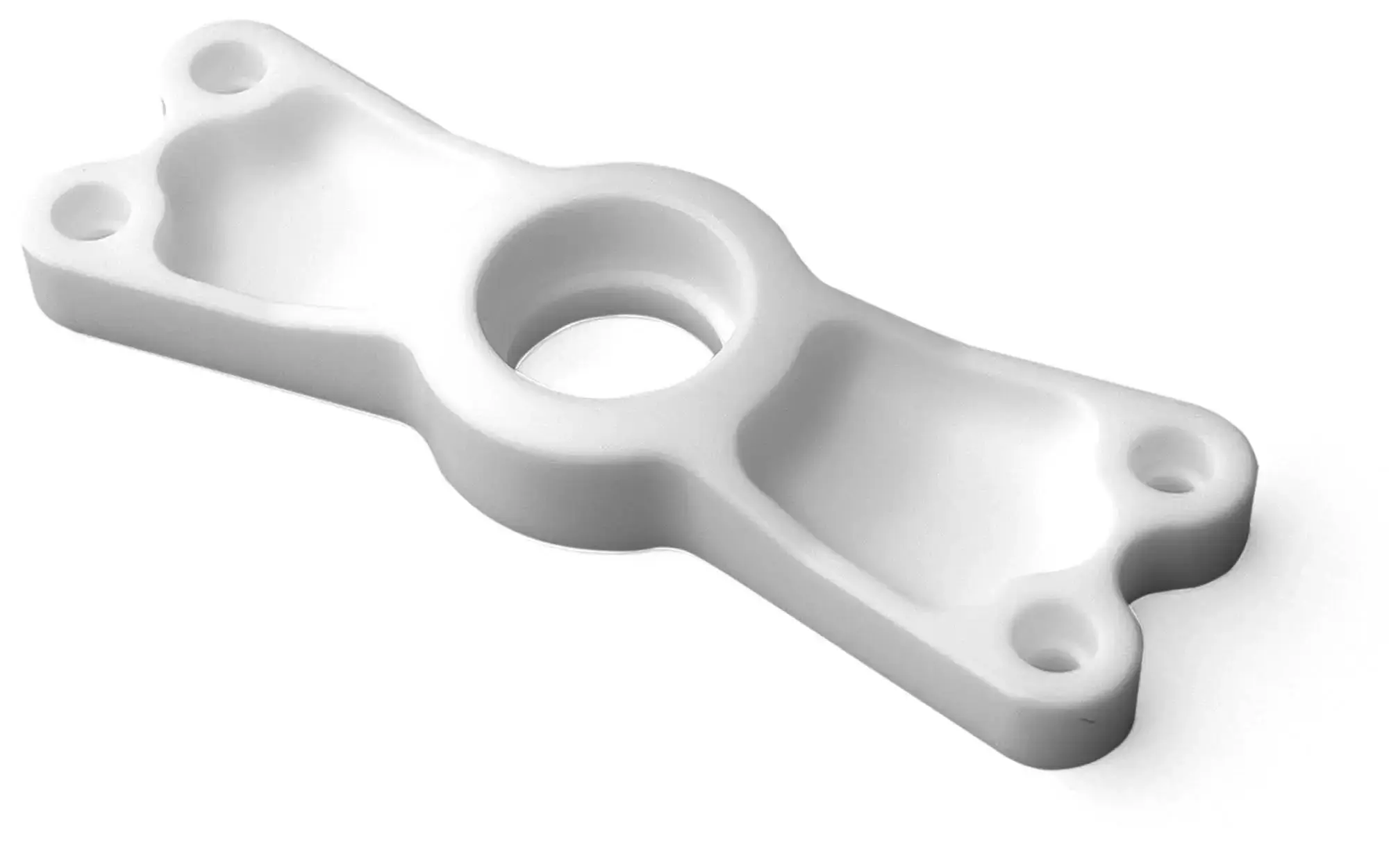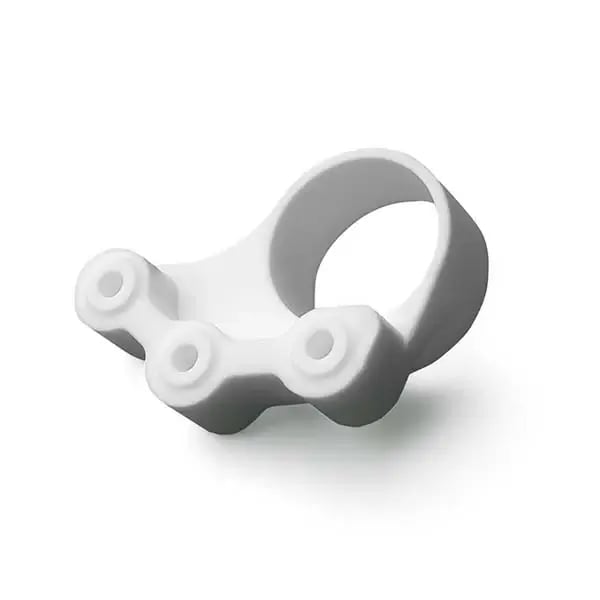TEFLON PTFE
A synthetic fluoropolymer that is known for its resistance to high temperatures, chemicals and corrosion. Used in many industrial and consumer applications due to its non-stick properties, very low friction coefficient and excellent electrical insulation properties.

PROS
- Excellent tribological properties
- Excellent thermal resistance
- Fantastic chemical resistance
- Suitable for food contact
- Excellent dielectric properties
CONS
- Not glueable
- Average mechanical properties
- Available only in natural color (white)
MAIN FEATURES
- Processing: CNC machining
- Tolerance: ISO 2768-1 medium (m) class. Info
- Max size: 500x500x90mm; 119.7x19.7x3.54in
- Lead time: <2 days
TEFLON CNC MACHINED VIDEO GALLERY
Tribological properties
Teflon has excellent tribological properties, i.e. low friction and wear resistance. This is due to its unique molecular structure that enables it to resist surface damage and reduce friction, making it an ideal material for use in applications requiring sliding surfaces. The low coefficient of friction also makes it suitable for use in bearings and other moving parts requiring low friction and wear applications.
excellent chemical resistance
Teflon (PTFE) is known for its excellent chemical resistance. The reason for this is its inert nature, which means it has a very low reactivity to most solvents, acids and bases. In addition, its non-stick properties make it highly resistant to adherence and accumulation of materials, making it an excellent choice for applications requiring chemical resistance.
FOOD CONTACT
Teflon is safe to use in contact with food as it is non-toxic and non-allergenic. In addition, it is an inert material, with very low reactivity in contact with most chemicals, so there is no risk of it getting into food.
QUOTE NOW YOUR TEFLON PARTS
free instant quoteTEFLON IMAGE GALLERY
COMMENT
Teflon (PTFE), a synthetic fluoropolymer, is renowned for its outstanding properties and advantages. This material is characterised by its high resistance to temperature, corrosion and chemicals, making it a preferred option for a wide range of both industrial and consumer applications. With a low coefficient of friction and superior electrical insulation properties, it is ideal for applications requiring sliding surfaces, as well as offering excellent chemical resistance due to its inert nature and non-stick properties.
Pro
Excellent tribological properties: Teflon PTFE is distinguished by its outstanding tribological properties due to its very low coefficient of friction. This characteristic makes it particularly suitable for use in bearings, seals, and other moving parts, where reducing friction is crucial. The ability to minimise wear contributes significantly to extending the life of components, reducing the need for frequent maintenance and replacement. This is particularly beneficial in industries such as aerospace, automotive and manufacturing, where component reliability and durability are crucial to safety and operational efficiency.
Excellent thermal resistance: Teflon's thermal resistance is remarkable, with the ability to operate reliably over a wide range of temperatures, without altering its properties. This resistance to high temperatures makes it ideal for applications requiring consistent performance under intense heat, such as engine components, chemical processing equipment and electronic equipment. Its thermal stability ensures that the material does not degrade or lose its mechanical properties, guaranteeing reliability and safety in critical applications.
Excellent Chemical Resistance: It is known for its exceptional chemical resistance, being nearly inert to almost all chemical agents, including strong acids, bases and organic solvents. This property makes it the ideal choice for use in extremely aggressive environments, where chemical resistance is imperative to prevent corrosion and material degradation. Typical applications include the chemical, pharmaceutical and food processing industries, where purity and resistance to contamination are essential.
Suitable for food contact: PTFE's non-toxic and non-allergenic properties make it safe for use in food contact applications. This material does not release harmful substances and does not react with food, maintaining its composition and quality. Its approval by international food contact regulatory agencies underlines its suitability for kitchen utensils, food packaging and machinery components used in food production and processing.
Excellent dielectric properties: Its dielectric properties are superior, making it an excellent material for electrical and electronic applications. Its high insulation resistance and low dielectric constant make it ideal for use as insulation in cables, connectors and electronic components, where effective protection against electrical interference is required. These properties help improve the performance and reliability of electronic devices, especially in harsh environmental conditions.
Cons
Non-glueing: One of the challenges in using Teflon PTFE lies in its inherent non-stick nature, which, although an advantage in many applications, makes it extremely difficult to bond with other materials. This characteristic limits assembly options, as conventional bonding methods often fail or prove unreliable over time. To overcome this challenge, specialised surface treatment techniques or mechanical bonding methods are required, which can increase the complexity and cost of the production process. This is particularly relevant in sectors such as aerospace and electronics, where the integrity of the assembly is critical to the safety and functionality of the final product.
Medium mechanical properties: Although it offers an impressive range of desirable properties, its capabilities in terms of mechanical strength and impact resistance are relatively moderate. This means that while the material excels in applications requiring temperature, chemical and electrical insulation resistance, it may not be the best choice for structural applications or heavy loads requiring materials with high mechanical properties. This limitation requires specific design considerations, where Teflon PTFE must be used in a complementary manner with other materials that can provide the necessary structural support, or in applications where mechanical stresses remain within tolerable limits for the material's performance.
Only available in white: The availability of Teflon only in white is a constraint for applications where aesthetics play an important role or where colour differentiation is required for functional or design reasons. This limitation may influence the choice of material in sectors such as consumer goods, interior design or consumer electronics, where the visual appearance of the end product is a critical factor. To overcome this restriction, designers may have to resort to alternative solutions for aesthetic integration, such as the use of compatible coatings or the selection of different materials for parts where colour is crucial, while retaining PTFE for those components where its unique properties are indispensable.
Applications
Food industry: In the food industry, this material plays a crucial role due to its ability to provide high quality non-stick surfaces. This property is particularly appreciated in the production of pots, pans and other kitchen utensils, where the ability to cook food without it sticking to the surface is essential not only for convenience but also to maintain the nutritional integrity and taste of food. It also finds application in food packaging, where its chemical resistance and inertness ensure that there are no harmful interactions between the packaging material and the food, thus preserving freshness and food safety.
Electronics sector: In the electronics sector, the polymer is widely used as an insulating material due to its superior dielectric properties. These characteristics make it ideal for insulating cables, connectors and other electronic components, where it is essential to prevent short circuits or electrical interference. Its ability to withstand high temperatures without degrading its insulating properties makes it particularly suitable for devices operating under thermal stress, ensuring long-term reliability and performance. Its presence in the electronics industry is a testament to its critical importance in protecting and improving the functionality of modern electronic devices.
Chemical industry: The chemical industry benefits greatly from the unique properties of Teflon PTFE, in particular its resistance to chemicals. This material is used in the manufacture of gaskets, valves and pipes that must withstand exposure to aggressive chemicals without being damaged or degraded. Its chemical inertness ensures that there are no unwanted reactions that could compromise process safety or the purity of the chemicals being handled. This characteristic is vital to maintain high standards of safety and efficiency in an industry where resistance to corrosive materials is an absolute necessity.
Mechanical Applications: In the field of mechanical applications, it stands out for its ability to reduce friction between moving parts, contributing significantly to reduced wear and increased component life. Bearings, seals and other mechanical parts benefit from its low adhesion and low coefficient of friction, which allow for smoother and less resistant movement, reducing the need for lubrication and maintenance. These properties are particularly valuable in industries such as automotive, aerospace and precision manufacturing, where operational efficiency and component durability are paramount.
Conclusion
Teflon has established itself as an extremely versatile and functional material whose range of applications is almost unlimited due to its exceptional properties. Despite some limitations, such as the difficulty of bonding and average mechanical properties, the advantages offered by this material, including excellent thermal and chemical resistance, superior tribological properties and suitability for food contact, make it irreplaceable in many sectors. Its ability to improve the efficiency and durability of the applications in which it is used confirms Teflon PTFE as an excellent choice to overcome technical challenges and improve product performance in a wide range of industries.
"I was looking for a reliable supplier of Teflon parts, and Weerg exceeded my expectations! The parts arrived quickly and were exactly as I ordered. Highly recommend!"
TEFLON PROPERTIES
| Tensile breaking load | 35 MPa |
| Modulus of elasticity | 750 MPa |
| Elongation at break | 400% |
| Flexural modulus | 672 Mpa |
| Flexural strength | 19,6 MPa |
| HDT 0.45 MPa | 135°C |
| Toughness (Charpy) | No break |
"From initial contact with Customer Care to delivery, Weerg's customer service was excellent! They had the best prices on Teflon parts and the quality of the parts received is super. 5 stars!"
Questions and answers
Teflon, also known as PTFE (polytetrafluoroethylene), is a thermoplastic polymer composed of carbon and fluorine. It is famous for its low coefficient of friction, high chemical resistance, and the ability to operate in a wide temperature range from -200°C to +260°C. Teflon is characterized by its high chemical inertness, making it virtually immune to most chemicals, and by its non-stick properties, which make it ideal for industrial and domestic applications.
Teflon (PTFE) is used in a wide range of applications thanks to its exceptional chemical, thermal, and mechanical properties. It is commonly employed for manufacturing seals, bearing coatings, gaskets, and piping due to its high chemical resistance and low friction coefficient. In the food industry, it is used as a non-stick coating for cookware. Additionally, it is widely applied in technical and industrial fields such as aerospace and electronics for insulating components and coatings resistant to heat and aggressive chemicals.
Teflon (PTFE) is the finished product obtained from the polymerization of tetrafluoroethylene (TFE), which is the base monomer. Tetrafluoroethylene is a reactive gas, while Teflon is the stable solid polymer derived from the chemical reaction of TFE. Essentially, Teflon represents the final plastic material used in numerous applications, while tetrafluoroethylene is the raw material needed to produce it.
Teflon is known for its excellent chemical and mechanical properties. It is highly resistant to chemicals, solvents, and acids, making it ideal for aggressive environments. It has a low coefficient of friction, making it perfect for non-stick applications and components that require reduced wear. Teflon can operate within a wide temperature range, maintaining stability and performance between -200°C and +260°C. It is also an excellent electrical insulator, with good heat resistance and aging properties.
Yes, Teflon is food-safe. It is widely used in the food industry for creating non-stick coatings on cookware such as frying pans and baking molds. Its chemical inertness ensures that it does not release harmful substances during use, making it safe for applications in direct contact with food. However, it is important to use it correctly, avoiding excessively high temperatures that could compromise its integrity.
QUOTE IN 1 SECOND WITHOUT COMMITMENT
DON'T WAIT: UPLOAD YOUR 3D FILE AND GET A QUOTE FOR YOUR PARTS NOW!
Upload your 3D file to get one step closer to manufacturing your parts.
free instant quote




